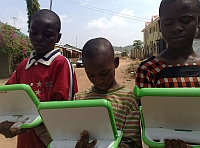I was fortunate to get involved this October with a computer project at a farm school in rural South Africa. This school had 12 computers for 185 students. None of them were XO laptops. Leaving out the R (reception or pre-school class) this left more than 100 students to share 12 systems.
Some immediate observations.
First, the native language of these children is Xhosa. They are at best EFL learners of English. With 12 computers, the children were limited to one hour per week of computer use.
The usage was dependent on English-speaking volunteers mostly from Europe. The volunteers mind-set was that the children's use should be productive (i.e. each child works on the task du jour) A typical session lasted a half-hour and finished when the child completed the task.
The computer labs rules explicitly prohibited playing of games. However, the computers had Mavis Bacon which included some typing games. This was the most popular activity for the children. The stated goal was for the children to become computer literate (meaning they know how to use Microsoft Office) as a byproduct of educational tasks (primarily topics on environment).
OLPC has several things right.
First, the computer is available to the child 24/7. Second, the child is expected to explore the machine, not complete tasks. Third, the screen has simple, colorful graphics. Fourth, the OLPC laptop supports languages other than English (although not as completely as it should given that almost all of the contributors are native English speakers).
I believe activities which support learning English must be a high priority. Second, activities which support reading and writing in the child's native language is critical. For example, I am trying to think how one could develop tutorials on ' how the computer works' which would communicate with minimal text (video, slideshow, simple localization of the necessary text, etc.) Third, to support these requirements we need text-to-speech capabilities in the native languages (a really tough one).
OLPC Karaoke
In many Asian countries (e.g. Philippines), karaoke is immensely popular. I would like to see a reader on OLPC which shows the text - with audio (recorded reader or text-to-speech) synchronized with text highlighting.
This would be an effective tool to teach young readers in their native language as well as English. I have not had a chance to try TamTam, but I would also like to see tools which allow the child to make her own karaoke song - e.g recording a native folksong (or original creation) with an optional vocal track. The tool should allow the song to be shared with the original vocal or a sing-along.
Anyway, I'm hooked. I hope OLPC can meet it's goal of placing 12,000,000 machines a year.
Tony Anderson has his G1G1 order in, but doesn't expect it before mid-January. In the meantime he's trying to use the sugar-jhbuild with Ubuntu.




first, sorry I did not understand: did your project on south africa start an olpc pilot? Or are you just comparing what the olpc could do in opposition to how the current lab works?
Second, making learning english as a priority for village children is a tricky subject. Learn it with english pop songs is a crime.
We should remember that every village has a local culture and we must use the computer to enhance that always. Then only after giving the locals a chance to get to know their own cultural heritage we can introduce a foreign language. Then: record, record, record. Allow them to compose music, shoot videos, take pictures, share among themselves. Maybe they don't even need an internet connection, just mesh will do.
And then when they get to a certain age, you can star with the whole karaoke as english lessons thing. Which by the way is a idea.
Alexandre,
Learning English through pop songs isn't the best way, but often it is the actual way people do it. Thankfully, Tony is not advocating that. He is promoting the idea of learning local language through traditional songs - a reinforcement of culture and tradition, not English domination.
Also, Tony was not involved with an OLPC pilot, I'll edit the post for clarity.
Learning material by setting it to music is a great idea. US baby boomers like me grew up watching the "Schoolhouse Rock" series on Saturday morning television. Those animated cartoons set to music lessons about multiplication tables, parts of speech, and important events and things in US history. (Can you still sing the entire Preamble to the US Constitution after all these years? I can. :) )
Those cartoons were geared toward American kids, but there's no reason that music can't be incorporated into lessons for the students of other countries, languages, and cultures. Done properly, I bet those lessons will stick with those kids just as long as the Schoolhouse Rock lyrics have stuck with those of us who grew up watching those cartoons. :)
Most teachers I work with feel that the earlier a child is introduced to a second language, the greater the chances are that the child will remember it and use it. A February 1996 Newsweek article made the claim that "A child taught a second language after the age of 10 or so is unlikely ever to speak it like a native." This statement is supported by linguists and has been proven in extensive research studies.
Music is often a shared experience which by it's nature is motivating to children. Children who learn another language through music, or more formal instruction, often show an improved overall school performance. Children who are exposed and encourage to take part in problem-solving activities such as open-ended (discovery based) software, also seem to extrapolate these skills to other areas of their lives. As someone who has taught for years in the inner city schools, I can tell you that "COMPUTER TIME" is always the most engaging time for students. They enjoy using Moovl, Scratch, and many of the free Web 2.0 tools. Many children have surprised themselves at the things they have been able to figure out and do. They even report back when something said in Math class relates to a computer project they are working on.
I have a feeling that many children who recieve the OLPC system will feel empowered.
learn language with songs? wow, i like that idea.. that's precisely why twext wants to happen.. to support intercultural language learning with popular lyrics:
http://wiki.laptop.org/go/WiXi#delyric
SLS (same language subtitling) already synchronizes text with popular music videos in Bollywood to teach literacy.. SLS already works with people who don't have the chance to go to school.. these people use stuff they already love (like music videos) to learn a new skill, (like how to read)..
http://googleblog.blogspot.com/2005/12/same-language-subtitling.html
streaming or synch'd karaoke text has plenty of room for improvement, but just to get it working simply and now on the xo will produce a lot of fun and incidental learning.. especially if/when simple video sharing is possible..
for most of us, language learning doesn't happen when studying rules of grammar.. real language learning happens when we connect, interact, learn how to ask questions, listen, go slow, get in the Csíkszentmihályian flow, get engaged and have lots of fun.
so learning language with popular music might not be a crime.. trying to block someone else's access to culture you don't like or trying to "protect" them from it might be disrespect.. the best way to protect someone's culture is to participate in it..
english is a defacto global standard.. instead of telling people not to learn english, or telling people how not to learn language, why not think positive? why not open up to ways we might more easily learn language, using whatever works for us?
imagine when we all can communicate in three or five languages.. the xo can help make it happen, because the xo connects the greatest language learners on earth: kids.
Learning through music is one of the most effective ways of learning. Children all over the world have been doing that since time immemorial. The thing that one has to observe or more so imbibe is that music must be parallel to ones culture. Language is not the issue but culture is. One can learn English music but the one that a child must relate to his/her own culture with. Hence, English music as it exits today, mostly Pop or Rock in the US and UK is certainly not the right one to introduce elsewhere.
About learning language:
A new language learned after the onset of puberty will never be mastered at the native level. There are exceptions, there always are, but they are very few.
If you don't learn to read and write in a language as a child, you tend to lose it if you stop using it.
The major stumbling block in learning a second language after childhood is to master the sound differences, both in hearing and in speaking.
Spanish speaking people may never really master the differences between all the English vowels, French speaking people may never master English stress patterns, English speaking people will continue to feel very uncomfortable with German gender and cases.
The only answer there is today is listen. If you want to learn a new language, listen to it as much as you can bear.
Listening to music (songs) in that language is one option, radio is even better (in comes Internet Radio). Switch to subtitled films (if you can) etc. I envisage children with the OLPC making films and podcasts in their own language, Spanish, Portugese, English, Hindi, Chinese, and subtitling them and then exchanging them to learn the other language.
With Karaoke, you also will be able to practice pronunciation. Pronunciation is something you have to practise like playing a piano.
I actually wrote an article about language learning on OLPCnews in May last year:
http://www.olpcnews.com/content/localization/american_laptop_child.html
What language will they learn:
In Africa and Asia, that's an easy one, Chinese :-) Not English.
South Africa is an exception, as English is a dominant language there.
In the Americas, Spanish will rise quickly, with Chinese a good second.
Winter
Kelley: You convinced me to change a position. Learning a second or third language before 10 might be very interesting.
Learning thru US-UK pop songs is definitively not. although I am not a supporter of restricting access to any culture to "protect" children, ut I am a supporter of giving them tools to enforce their own culture.
Raise their hands who would like to help building a karaoke/lypsync recorder for the XO? Not one that downloads musics from the web, but one that allows you to record it yourself and share with friends.
"Raise their hands who would like to help building a karaoke/lypsync recorder for the XO?"
Is SnackAmp already included in the XO? (Tcl/Tk)
http://snackamp.sourceforge.net/
What is actually needed for such a recorder?
There are a lot of annotating Tools. No need to reinvent the wheel:
http://www.w3.org/2005/Incubator/mmsem/wiki/Tools_and_Resources
Winter